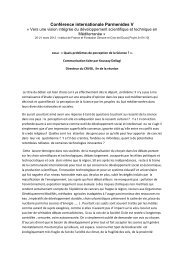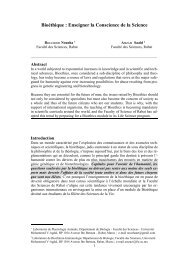Create successful ePaper yourself
Turn your PDF publications into a flip-book with our unique Google optimized e-Paper software.
cedes to the reforms of the law in some American states to make it<br />
gender neutral. There is certainly a need to make sexual violence more<br />
gender neutral, given the evidence that women also sexually abuse men,<br />
and men do abuse men. Various Ghanaian media reports confirm that<br />
male abuse is more common that has been thought. Only too recently<br />
BBC carried a story about Zimbabwean women’s rape of men, though<br />
ostensively for ritual purposes. See Steve Vickers’ report:<br />
http://www.bbc.co.uk/news/world-africa-15876968 - accessed 29 th<br />
November, 2011. 1 Varga (2001) is right in demanding that sexual and<br />
reproductive health research and programs in Sub-Saharan Africa not<br />
ignore boys and young men.<br />
Given the pervasiveness of sexual violence, it seems legitimate to ask<br />
what women themselves have done and still do about the situation. In<br />
recent times with the emergence of the feminist activism a number of<br />
NGOs have taken up the course of women, and have succeeded in<br />
conscientising policy makers and the public to issues that militate<br />
against women’s interests. There is abundant discussion of these interventions.<br />
However what remains missing is what women in the past<br />
women did about their harassment. The silence seems to suggest that<br />
women have always been helpless. The literature comments on women’s<br />
acceptance that men – husbands and boyfriends - are justified in exercising<br />
violence on their women. Glover et al. (2003: 35) found that 73%<br />
of adolescent respondents agreed that under certain circumstances it<br />
would be acceptable for a husband to beat his wife, and 58% thought<br />
there could be justification in a man beating his girlfriend, if she was<br />
flirtatious towards other men. More recent studies seem to support this.<br />
See for example, the Ghana Multiple Cluster Survey (MICS) 2006 revealed<br />
that 47 per cent of women between 15 to 49 years of age believed<br />
that a husband is justified in beating his wife. 2<br />
This sexual under-privileging of women may be norm; however it cannot<br />
be doubted that in some instances women also defended themselves,<br />
especially where women’s associations were found and women<br />
1<br />
It is claimed that the ‘... Zimbabwean police believe there is a nationwide syndicate<br />
of women raping men, possibly to use their semen for use in rituals that claim to<br />
make people wealthy’. Three women were to be tried in court over the allegation.<br />
The victims are alleged given what seems like an aphrodisiac to put them in the<br />
mood for intercourse.<br />
2<br />
See http://www.myjoyonline.com/news/200806/17367.asp. Accessed 18th June,<br />
2008.<br />
- 185 -
















